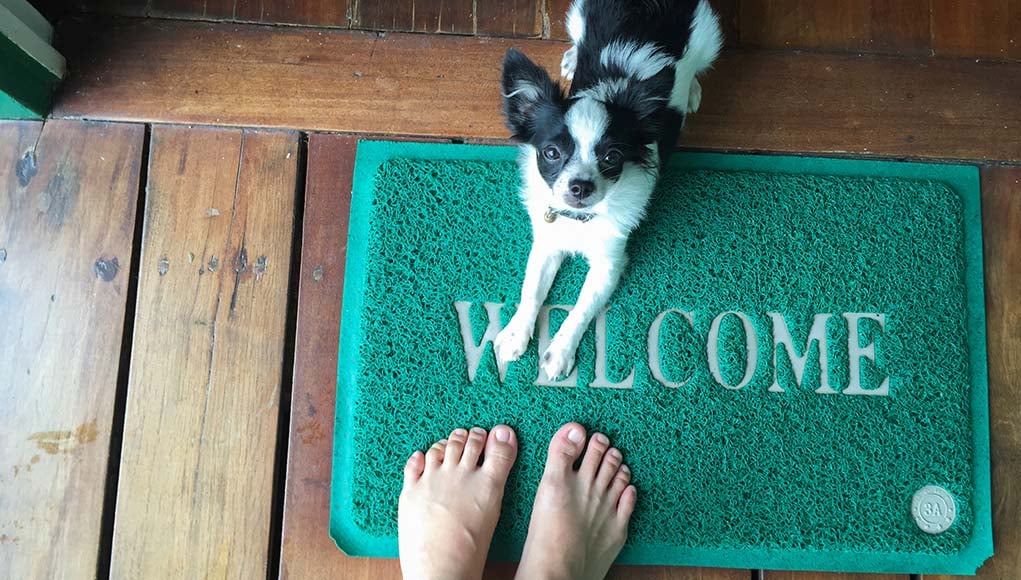For anyone who loves dogs, taking care of someone else's pet may sound like a great idea at first. However, there are several things you must consider beforehand, whether you currently have a dog of your own or not. Chances are that your friend, cousin, colleague or neighbor will ask you to take care of their dog at a certain point. It can sound like a great idea and an adventure time, but there are things you should think about before deciding that you are ready to do it or under which circumstances.
1. Timeframe
If your friend asks you to take care of her dog for a couple of hours while she is on a date, generally it's a fairly easy task. You will probably have very little or no responsibilities because she already fed and walked the dog, played with him, and gave him the necessary medicines, so it is up to you to pet him or let him sleep in your room. This likely to be fun without having to worry about obligations which come with the dog.
On the other hand, you may be asked to take care of a dog for a whole weekend or even a week while your neighbor is on a vacation. This is tricky. In this case, you would need to fully replace the dog owner for a significant amount of time; you may need to adjust your private life to having a dog and learn all about the animal's needs and habits.
Consider the burden of responsibility this bears and your own personal traits. For example, ask yourself the many questions new owners must ask themselves: would you panic should the dog got injured or sick? Are you patient enough, and would you be bothered by barking in the middle of the night when the dog hears something outside?
2. Your Experience with Dogs
 To most people who love dogs, taking care of another pet may seem like a joyful experience, even if you don’t have one of your own. But your previous experience with dogs will not be enough to decide how difficult it may be for to care for an unfamiliar animal. Every dog is unique and you should never generalize their traits and habits.
To most people who love dogs, taking care of another pet may seem like a joyful experience, even if you don’t have one of your own. But your previous experience with dogs will not be enough to decide how difficult it may be for to care for an unfamiliar animal. Every dog is unique and you should never generalize their traits and habits.
Now, if you already have a dog yourself, it will probably be easier for you to take care of another one to a certain extent. For example, if you're already used to taking a dog for a walk, it would not be an issue if another pet joined in. If you are feeding your dog, you will easily remember to prepare another portion for your friend’s dog. People who don’t mind dog barking in their house from time to time would probably not be affected by the two of them barking in choir.
On the other hand, having a dog of your own may also cause problems. The two dogs might not get along, or don’t eat the same food or the same amount, or that one is used to the collar while the other one is used to a harness. Think about their unique traits and the many ways you'll have to address them.
Since you might not know how the other dog behaves, consider your own dog’s behavior: is he friendly? Does he like playing with other dogs? Is he aggressive when you devote your attention to other dogs? If you perceive that keeping them together can cause any issues, it is better to avoid the duty of taking care of someone else's dog.
Probably the most difficult scenario is if you never had a dog and you are not used to having one around, and you wouldn't know how exactly to care for the animal. Think about all the things that you need to prepare and all your private plans that you need to adjust in order to replace the dog’s owner for a significant period of time.
3. Dog’s Age and Behaviors
 When considering whether you should take care of somebody else’s dog, you must also think about the dog’s age. Caring for an adult dog is much easier than caring for a senior canine or a puppy. So maybe you know your way around older dogs, but you’ve never had a young pup.
When considering whether you should take care of somebody else’s dog, you must also think about the dog’s age. Caring for an adult dog is much easier than caring for a senior canine or a puppy. So maybe you know your way around older dogs, but you’ve never had a young pup.
Older dogs, especially large breed dogs, will usually be calmer and unlikely to start running around, chasing a cat or playing with a passerby. Out of all scenarios, caring for a senior animal is likely to be the easiest task. If they are used to confined spaces, they will probably know how to behave, understand the tonality of your voice and other signals showing them they are doing something bad. Plus, they might even know some cool tricks to show you.
Puppies, while very cute, are more needy and sensitive; they're more curious, energetic, adventurous and less well-trained. If the dog owner didn’t have time to train their puppy properly, the young dog might not know about proper behavior and will try to eat food from your table, break something or bite your shoes.
In the development phase, puppies are more sensitive to the environment and very curious. While you might get very excited at the thought of taking care of a puppy for a week (because everybody loves puppies), before accepting the proposition, think about the amount of attention you can devote to this young pup, because he will need a lot of it. Also, consider the optimal environment for him, kids or other dogs being around, room temperature, the food he'll need to eat, and any medicines he might be taking.
4. Your Daily Routine
Every dog has a daily routine they are used to. If you are one of the people who like to sleep in, it's possible that your new dog won’t allow it. He will ask you to take him out for a bathroom break, or for food at the precise time when he usually expects these things.
The same goes for other regular tasks like a general walk, playtime, taking a medicine or sleeping. Think about whether you are ready to put your life on hold if necessary or to sacrifice your everyday routine for someone else’s dog.
If your current life dynamic is full of unpredictable situations such as meetings, professional obligations or friends waiting for you to pick them up at the airport, it is better to reschedule taking care of another person’s dog for a more suitable time.
RELATED: The Complete Guide to Fostering a Dog
How to Take Care of Someone Else’s Dog
 After you've considered all of the above and you still decide to accept this responsibility, here are some useful tips for caring for another owner's dog so that the whole experience to go smoothly for everybody involved:
After you've considered all of the above and you still decide to accept this responsibility, here are some useful tips for caring for another owner's dog so that the whole experience to go smoothly for everybody involved:
Prepare Yourself
Before you take the dog in, talk to the owner to learn all that is necessary to take care of their dog. This includes the dog’s personality, his daily routine, what food he eats, has the dog been housebroken, is he trained and what commands he knows, and other important things that could prepare you for the task.
In addition to this, you need to prepare your home for the dog. Decide where your new pet is going to sleep, where he is going to eat, learn how to properly introduce the dog to your existing pets or children if you have any.
Keep Your House Safe
Dogs get used to the surroundings where they spend a lot of time. Even if there are some dangerous things lurking in their owners’ houses, they will quickly learn to avoid them.
However, your house is an uncharted territory for the temporary resident, so be mindful of their well-being. Safeguard sharp objects and furniture edges. Keep them away from steep staircases and the places where they can get stuck. Don’t leave the back or front door open, because they might run away.
Additionally, keep them away from bathrooms and kitchens where they can find harmful chemicals, or store them in the cupboards. Make sure your garbage cans are out of reach for them, or use dog-proof trashcans instead (many regular ones have same options).
Have Emergency Contacts
If you have experience with taking care of dogs, you will probably have one or two vet numbers in your phonebook. If you are a newbie to this task, prepare yourself. Even with our best intentions, accidents happen; dogs get sick or start acting strange.
In these situations, you should always have prepared emergency contacts – several veterinarians and animal poison control hotline. Ask the dog owner to give you the number of the dog’s regular vet. If this is not close to your home, explore additional options in case you have to arrive quickly to the clinic. Check the vet’s working hours and learn where the closest veterinarian working after-hours is.
Think about a friend or a family member whom you would be able to call if you cannot reach the dog owner and you are not sure what to do. This friend, of course, has to be the one who knows more about dogs than you.
Summary
Taking care of somebody else’s dog can be a responsibility we would always gladly accept and repeat as often as needed. However, before accepting it there are many things to consider, because things can always go wrong.
 Before welcoming a pooch into your home, picture your life with that dog and ask yourself if they fit into your daily schedule and dynamic of life. Even if you think nothing bad can happen, always prepare several emergency contacts.
Before welcoming a pooch into your home, picture your life with that dog and ask yourself if they fit into your daily schedule and dynamic of life. Even if you think nothing bad can happen, always prepare several emergency contacts.
If you are not sure that you can handle somebody else’s dog, don’t feel embarrassed to say ‘No’ and explain why. Your friend or neighbor may appreciate you being upfront, since they are the last person wanting something bad happening to their pet. Taking care of a dog takes time to practice and the only wrong choice is accepting something you are not ready for.
READ NEXT: 26-Step Checklist for Adopting a New Adult Dog or Puppy













